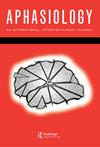语言病理学家治疗失语症的咨询实践:“我没有接受过充分的实际咨询策略培训。”
IF 1.5
4区 医学
Q2 AUDIOLOGY & SPEECH-LANGUAGE PATHOLOGY
引用次数: 0
摘要
【摘要】背景咨询是语言病理学家(slp)实践范围的一部分,然而各个项目的培训一直不一致。学生、临床研究员和执业slp都报告说,他们在解决客户及其家庭的咨询需求方面准备不足。专门针对失语症患者及其家庭心理健康的咨询培训和实践的研究证据更加有限。虽然练习特殊语言处理者有信心并准备好应对针对失语症的特定沟通干预措施,但他们对应对定期出现的咨询需求感到准备不足。本研究是一项由两部分组成的调查的一部分,其中包括对全美国执业slp的在线调查和对这些参与者的一个亚组的随访访谈。本文讨论了咨询实践访谈部分,并解决了两个研究问题:在对失语症患者进行咨询时,语言服务提供者有多自信?在实践中,语言服务提供者对失语症患者及其家庭成员实施咨询的程度如何?方法与程序参加第1部分咨询实践调查的8名执业slp同意参加第2部分咨询实践干预。它们因执业年限、执业区域和执业环境(急性、亚急性和慢性)而异。参与者通过BlueJeans视频会议应用程序参与咨询实践访谈(CPI)。使用开放和轴向编码方法对访谈进行定性转录和编码。进行多轮迭代编码,确保编码的严谨性和稳定性。多轮编码产生了以下总体主题:对失语症特定技能/技巧的信心,SLP经常遇到情感和心理社会讨论,对教育咨询的信心,对心理社会调整咨询的准备,从失语症患者及其家庭的角度来看,转诊/跨专业实践和实践问题的范围,以及SLP自我护理。slp报告说,他们感到准备和自信的知识和技能与解决失语症患者的心理健康和理解实践界限之间存在明显差异。结论:心理咨询师认识到咨询技巧对失语症患者工作的重要性,因为咨询时刻经常出现。他们使用各种各样的技术,但缺乏目的性和专门的训练。学术培训被认为在范围和教学方法上是不够的。毕业后的培训被认为很难获得,但很有用。slp报告缺乏对实践范围、实践界限和转诊的澄清。关键词:辅导教育实践范围失语症致谢第二作者因本工作的研究基础被授予校级优秀硕士论文。我们要感谢第二作者的论文指导老师L.Q.和t.s.。感谢我们的研究助理Caryn Donahue和Brianna Bennett在转录和格式化采访记录方面所做的大量工作。最后,感谢参加这些访谈的slp。补充材料本文的补充数据可在https://doi.org/10.1080/02687038.2023.2262682.Disclosure上在线获取声明作者未报告潜在的利益冲突。未来的发展方向很明显,在学术和后学术背景下都需要更系统的心理咨询教育。有必要澄清实践范围,因为本研究中的slp不确定他们的角色和专业界限。本文章由计算机程序翻译,如有差异,请以英文原文为准。
Counseling practices of speech-language pathologists working with aphasia: “I did not have adequate training in actual counseling strategies.”
ABSTRACTBackground Counseling is a part of the scope of practice for speech-language pathologists (SLPs), however training has been inconsistent across programs. Students, clinical fellows, and practicing SLPs alike report feeling under-prepared to address the counseling needs of clients and their families. Research evidence about counseling training and practices specific to addressing the psychological well-being of individuals with aphasia and their families is even more limited. While practicing SLPs feel confident and prepared to address communication-specific interventions for aphasia, they feel ill prepared to address the counseling needs that arise on a regular basis.Aims The present investigation was part of a two-part investigation that included an online survey to practicing SLPs throughout the United States (US) and follow-up interviews with a subgroup of those participants. This paper addresses the counseling practice interview portion and addresses two research questions: How confident do SLPs feel using counseling with individuals with aphasia? To what extent are SLPs implementing counseling in practice with individuals with aphasia and their family members?Methods & Procedures Eight practicing SLPs who participated in the part 1 counseling practices survey agreed to participate in the part 2 counseling practices intervention. They varied by years of practice, region of practice, and practice setting (acute, subacute, and chronic). Participants engaged in the Counseling Practices Interview (CPI) via the BlueJeans video conferencing application. Interviews were transcribed and coded qualitatively using open and axial coding methods. Multiple rounds of iterative coding were conducted to ensure rigor and coding stability.Outcomes & Results Multiple rounds of coding resulted in the following overarching themes: confidence in aphasia-specific skills/techniques, SLPs encounter emotional and psychosocial discussions regularly, confidence with educational counseling, not prepared for psychosocial adjustment counseling, taking the perspective of individuals with aphasia and their family, referrals/interprofessional practices and scope of practice issues, and SLP self-care. SLPs reported a clear difference between knowledge and skills for which they feel prepared and confident, versus addressing psychological well-being of individuals with aphasia and understanding practice boundaries.Conclusions SLPs recognize the importance of counseling skills for working with individuals with aphasia because counseling moments arise regularly. They use a variety of techniques but lack intentionality and specialised training. Academic training was deemed to be inadequate in scope and instructional methods. Post-academic training was identified as hard to access but useful. SLPs reported a lack of clarify on scope of practice, practice boundaries, and referrals.KEYWORDS: counselingeducationscope of practiceaphasia AcknowledgementsThe second author was awarded the university-wide distinguished master’s thesis for research foundational to this work. We would like to acknowledge the second author’s thesis advisors, L.Q. and T.S.. Thank you to our research assistants, Caryn Donahue and Brianna Bennett for their extensive work in transcription and formatting the interview transcripts. Finally, thank you to the SLPs who participated in these interviews.Supplementary MaterialSupplemental data for this article can be accessed online at https://doi.org/10.1080/02687038.2023.2262682.Disclosure statementNo potential conflict of interest was reported by the author(s).Future DirectionsThere is a clear need for more systematic counseling education in both academic and post-academic contexts. There is a need for clarification of scope of practice as SLPs in this study are unsure about their roles and professional boundaries.
求助全文
通过发布文献求助,成功后即可免费获取论文全文。
去求助
来源期刊

Aphasiology
医学-临床神经学
CiteScore
4.40
自引率
15.00%
发文量
74
审稿时长
6-12 weeks
期刊介绍:
Aphasiology is concerned with all aspects of language impairment and disability and related disorders resulting from brain damage. It provides a forum for the exchange of knowledge and the dissemination of current research and expertise in all aspects of aphasia and related topics, from all disciplinary perspectives.
Aphasiology includes papers on clinical, psychological, linguistic, social and neurological perspectives of aphasia, and attracts contributions and readership from researchers and practitioners in speech and language pathology, neurology, neuropsychology and neurolinguistics. Studies using a wide range of empirical methods, including experimental, clinical and single case studies, surveys and physical investigations are published in addition to regular features including major reviews, clinical fora, case studies, and book reviews.
 求助内容:
求助内容: 应助结果提醒方式:
应助结果提醒方式:


